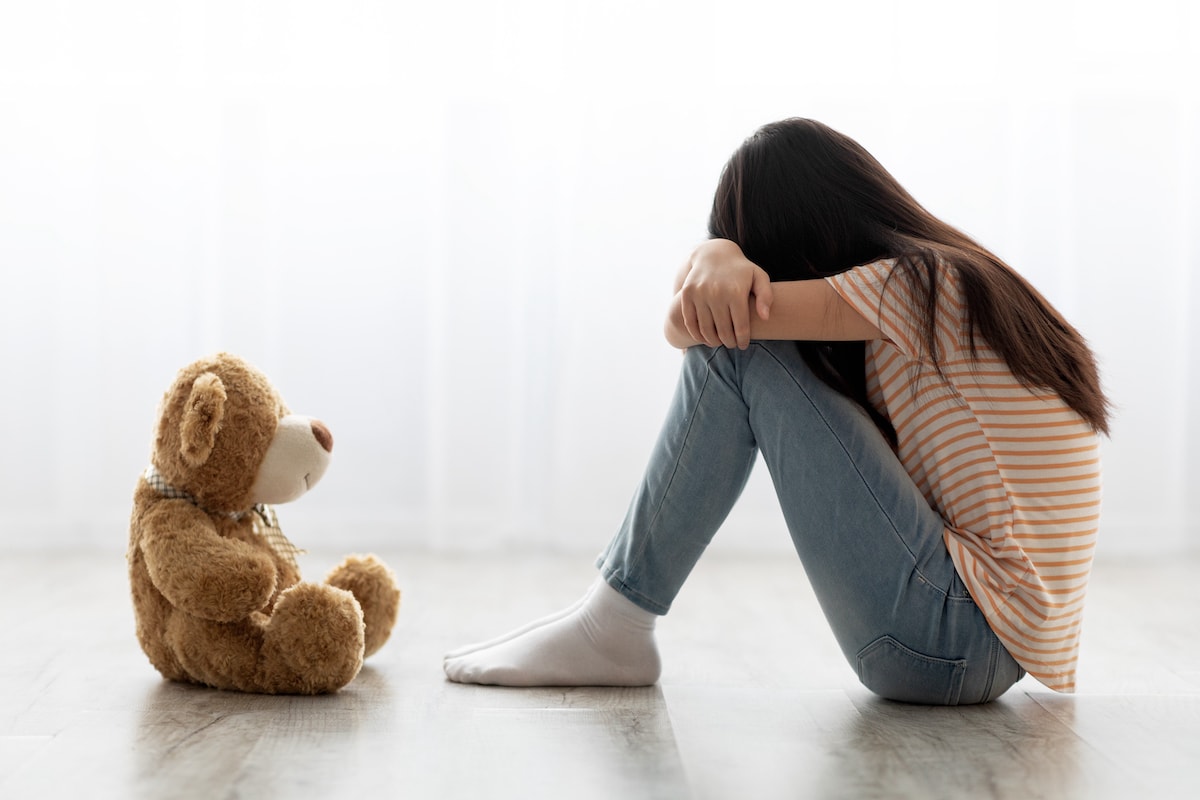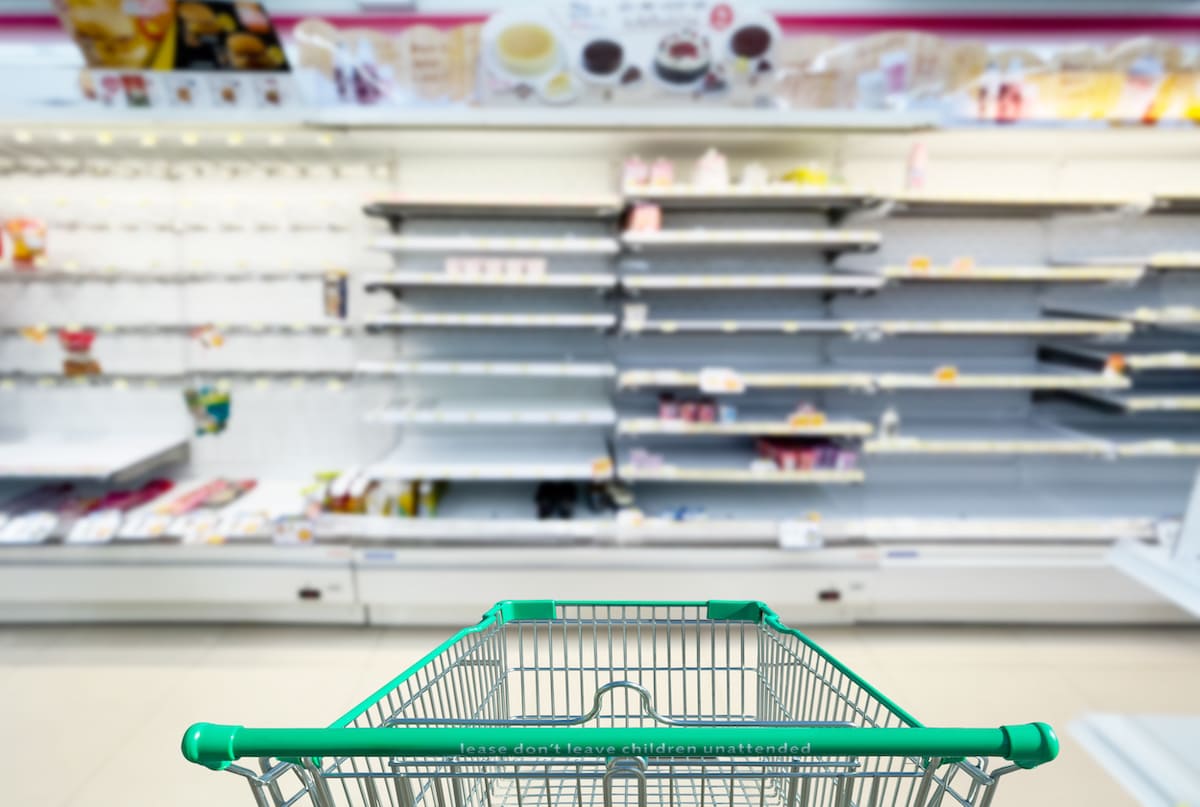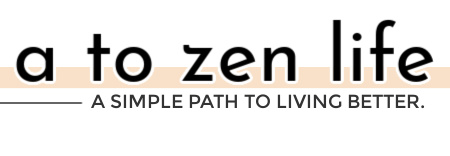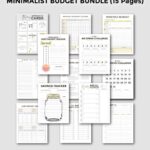Minimalism in a Crisis – What To Do?
This post may contain affiliate links for your convenience. That means that if you make a purchase, I will receive a small commission at no extra cost to you. Read more here.
When it feels like the world is dissolving into chaos around you, you might be tempted to start panic-buying and hoarding items. But does this defense mechanism help or hurt you in the long run? Or is the counter-intuitive answer to instead turn to minimalism in a crisis?
Following the recent global events, I’ve been getting more and more worried messages from my followers asking me my thoughts on dealing with a crisis as a minimalist and if it was putting my family at a disadvantage.
Are we regretting our transition to family minimalism?
This is a topic that has been at the back of my mind in the past month, so today, we will discuss why minimalism may be even more important in a crisis.

What is a crisis?
The online Oxford Dictionary defines a crisis as being “a time of intense difficulty or danger.”
A crisis occurs when an event happens that causes a disruption or breakdown in normal patterns of function at the personal, familial, societal, economic, or global level.
Crises can include:
- Personal crises in the face of abuse, addiction, mental health issues, or job loss
- Family crises like spousal abuse, chronic illnesses, or loss of a loved one
- Economic crises such as loss of employment, inflation, debt, and bankruptcy
- Natural disasters like earthquakes, floods, and global pandemics
- Existential crises that arise from inner conflicts causing turmoil in your own psyche, often related to identity, purpose in life, spirituality, or direction – a common example of this is the so-called “midlife crisis”
RELATED POST: How to Survive on One Income without Feeling Broke [10 Tips]
The Benefits of Minimalism in a Crisis
Pandemics, natural disasters, inflation, and war – it seems like the past few years have been a non-stop parade of one crisis after another.
In times like this, a normal human reaction is to hold on, hoard, and collect things to “protect themselves.”
The stress, anxiety, and panic usher in a scarcity mindset that lives rent-free in the back of our minds and darkest corners of our hearts.
On the opposite side of that is minimalism. The benefits of minimalism have been well-documented, from stress relief to improved health.
Of course, those are under “normal” circumstances – what about when minimalists face a crisis scenario?
The first thing to remember is that minimalism is a mindset, not a material possession. That means that the principles of minimalism can be applied to any situation, whether you’re dealing with a personal crisis, such as grieving the loss of a loved one or facing a natural disaster.
Minimalism in a crisis can help you focus on what’s important, let go of what’s not, and find peace and balance in the face of adversity.
READ MORE: 90 Letting Go Quotes to Move On and Heal the Pain
How minimalism has helped us in crises
One of the most common complaints I get on my minimalist mom YouTube channel is that well-off people like myself and my husband couldn’t possibly understand what it’s like to live through a horrible crisis.
When people judge us by our beautiful home and the calm and happy life we have now, they aren’t seeing the long and hard road we walked to arrive here.
They don’t know the mental, emotional, and financial battles I fought after losing my parents and childhood home.
They weren’t there as my husband’s family struggled to survive third-world poverty in the mountains of China, or when he moved to the USA with a single backpack of belongings and lived in someone’s backyard shed to save money while attending college.
It’s impossible to count the number of times I turned to my husband during the pandemic and said, “Aren’t you so glad we simplified our life to this extent?”
A minimalist lifestyle has done a great deal to ease our stress and anxiety and lighten our burden in the tough times so we can focus on what matters most – our loved ones, health, and safety.
READ MORE: 7 Tips to Extreme Declutter Your Home from an Ex-Hoarder Turned Minimalist Mom

7 Things to Do as a Minimalist in a Crisis
No one is immune to panic, fear, and scarcity mindset, and letting go of these habits and behaviors can be difficult.
Here are seven action steps you can take as a minimalist in a crisis.
1. Develop a routine
Routines are invaluable.
Creating a routine helps you maintain order, keeps you on schedule, and helps make things predictable They also help children feel safe and secure in uncertain times.
These can include:
- morning routines for waking up and getting ready for the day
- exercise and health routines, like taking vitamins
- nighttime routines for rest and good sleep hygiene
- meal planning and grocery shopping routines
- and more
Having gone through a pandemic, my children now know that when they get home from school, after taking off their shoes and coats, the very first thing they need to do is go and wash their hands.
That was a new behavior we had to train them and ourselves to remember in light of the changing times. It’s not easy to get into a new routine, but it is possible and beneficial.
2. Mind your budget
As a minimalist family, we go for quality over quantity and practice mindful shopping as much as possible, and keeping a budget has always been a big part of that.
I’ve been the designated “Keeper of the Budget” in our family for the past 12 years, and each time we’ve experienced a big, life-changing event, I make it a practice to re-adjust our budget to fit the new circumstances.
How to start budgeting:
- if you’re a beginner, track spending for 30 days (use this printable)
- write down all your monthly payments and expenses
- check for categories you overspend on
- cut unused or unnecessary monthly subscriptions or memberships
- trim excess spending in key budget categories
“Money isn’t about buying bigger and better things. It’s about being prepared to take care of your family.”
READ MORE: 10 Simple Minimalist Budget Tips to ACTUALLY Save Money!
3. Keep decluttering
A lot of people might be surprised to hear the suggestion that they should keep decluttering.
But more and more, you will appreciate how having less clutter can help you feel more at peace and less anxious in your own home.
Crises often make people want to hang on and start hoarding things due to a scarcity mindset – it’s human nature!
However, if you stop and think about it, most of the stuff in your home that you were going to declutter anyway isn’t going to help you in a crisis.
Let’s say you wanted to get rid of a bread maker that you haven’t touched in the past five years, but you’re hesitating to get rid of it because you might need it.
The truth is, if you weren’t using the bread maker in easier times, you’re not going to be likely to turn to it in times of hardship. When things get tough, it’s better to focus on keeping things simple and stress-free.
This will help you direct your energy, time, space, and money towards things that really matter.
4. Re-Home Clutter in meaningful ways
Make it a practice to re-home clutter as fast as possible.
If you are in the middle of financial hardship and need more money, you can sell your clutter for extra cash.
If not, look for ways to donate or give away that item to the benefit of someone else. Goodness knows there are plenty of reasons to do this, no more than ever!
“No one has ever become poor by giving.”
– Anne Frank
FIND OUT MORE: 50+ Mindful Ways to Get Rid of Stuff After Decluttering
5. Make a Plan
A crisis can strike suddenly and without warning.
When bad things happen, it’s best to have a plan on how to deal with them. If you wait until you’re in the middle of the crisis, it’s much harder to make clear and rational decisions.
If you have a spouse or partner, take the time to sit down and talk about what you would do in a crisis scenario.
Ask yourself questions like:
- Do you have an emergency kit?
- What necessary paperwork do you need to have or complete? (i.e., last will and testament or passports)
- What would you take with you in the event of a natural disaster?
- Where would you go?
- Who could you contact for help?
6. Unplug When Overwhelmed
It’s normal to feel overwhelmed when a crisis hits you or someone you love.
The past few years’ events have left many of us stressed out, anxious, and overwhelmed to the point where it’s even been dubbed “crisis fatigue” by mental health experts.
Beyond the action steps we’ve already discussed, how can you handle the emotional burden?
While it’s important to stay informed and educated about current events, constantly reading and obsessing about the news and things outside of your control can seriously strain your mental health.
If you find yourself doom scrolling and constantly worried as you follow along with the news and social media, then you might need to unplug and reduce your media exposure.
Remember, you matter too, and it’s hard to care for others if you aren’t taking care of yourself first.
READ MORE: 20 Helpful Tips for When You’re Feeling Overwhelmed by Life

READ MORE: 20 Things to Let Go for a Better & Happier Life
7. Adapt to change
When times change, your needs and the needs of those around your might change as well.
Being a minimalist does not mean that things will always stay the same, and you will never need to make a purchase ever again! Observe yourself, your home, your family, and your environment, and shift your habits and purchases as necessary.
Just because something is essential right now doesn’t mean you will always need that thing in the future. Likewise, you don’t need to feel guilty if your needs change and you need to buy something.
Edit your life frequently and ruthlessly. It’s your masterpiece after all.
– Nathan Morris
BE INSPIRED: 120 Minimalist Quotes to Simply Live a Better Life
Final thoughts on minimalism in a crisis
Minimalism is not about depriving yourself of the things you need or love.
It’s about making sure that the things you surround yourself with add value to your life and keep you and your loved ones safe and happy.
In a crisis, these needs might change, but that doesn’t mean minimalism has to hold you back – instead, look for ways to maintain that “less is more” mantra to stay safe and well.
Here are more ideas to get you started:
- 70 Simple Living Quotes to Embrace the Joy of Simplicity
- How to Do a No-Spend Challenge and Save Money [PDF]
- 25 Small Ways to Be Intention in Your Life and Habits

